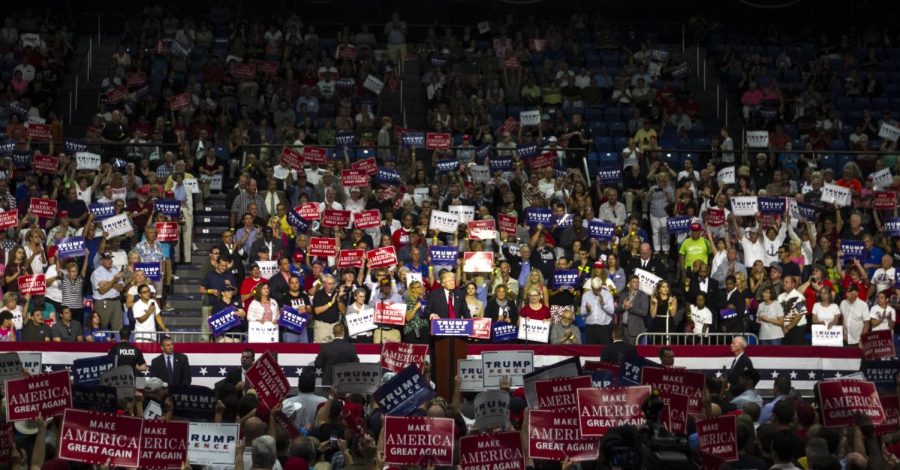Presidential nominees face scrutiny on campaign trail
August 30, 2016
This election year is unlike any other. From the first woman representing a major political party to a businessman with no prior experience leading a second major political party, the campaign trail has seen out-of-the-ordinary events and circumstances.
Donald Trump, a self-made billionaire businessman, made headlines last June when he announced his run for the Republican Party’s presidential candidacy.
Running on a platform initially centered around his plan for “building a wall” at the Mexican-American border to keep illegal immigrants out, Trump has been noted for switching his viewpoints and plans for various policies.
Trump’s immigration plans for the 11 million illegal immigrants in the country was clear when he first proposed it back in December.
Recently, however, he said in a Fox News interview last week that he would be open to “softening” his plans for immigration. This caused outrage among his supporters.
In response, Trump appeared to revert to his original stance and attempted to clear up any confusion in an interview with CNN on Thursday:
“There’s no path to legalization unless they leave the country,” he said. “When they come back in, then they can start paying taxes, but there is no path to legalization unless they leave the country and then come back.”
He also voiced the need for extreme vetting of immigrants from countries, as well as a “total and complete shutdown of Muslims entering the United States until our country’s representatives can figure out what is going on.”
On Sunday, Trump announced via Twitter that he will be making an immigration policy speech Wednesday in Arizona.
“I will be making a major speech on ILLEGAL IMMIGRATION on Wednesday in the GREAT State of Arizona. Big crowds, looking for a larger venue,” he tweeted.
Trump also released a $10 million campaign ad called “Two Americas: Economy” that is set to air in Colorado and Virginia next week. The ad focuses on comparing how the Republican candidate’s presidency would benefit the economy over the Democratic candidate’s administration.
Democratic presidential nominee Hillary Clinton has consistently lead in national polls since the conclusion of the Democratic National Convention in July. Recent polls, though, have shown her percentage increase as decreasing slightly.
A Monmouth University polls released over the weekend found Clinton’s lead, while still present, had decreased since the beginning of August. She leads 49 to 42 percent, a 7-point lead.
In comparison to earlier this month—where an NBC News/Survey Monkey Weekly Tracking Poll put Clinton at a 10-point lead—Trump has closed in.
In the past week, Clinton has continued to be at the forefront of a controversy surrounding the use of her private email to send classified documents as secretary of state. The issue has followed her along the campaign trail, causing her trustworthiness and honesty to be questioned by voters.
A U.S. judge last Monday ordered the State Department to turn over all 14,900 emails and documents exchanged between the White House and the former secretary of state from the week of the September 2012 attacks in Benghazi, Libya, that were found during an investigation conducted by the Federal Bureau of Investigation.
The department has until Sept. 13 to release the documents.
This latest development follows the FBI’s recommendation in July of not pressing charges on Clinton for her “extremely careless” handling of classified information.
On the campaign trail, Clinton released a comprehensive plan Monday to address the widespread mental health problems in the country.
The proposal includes launching a national initiative for federal support of suicide prevention, enhancing community-based treatment of mental health coverage, widening payment structures of Medicare and Medicaid, improving access to housing and job opportunities, as well as investing in brain and behavioral research.
Clinton’s plan promises she will organize a White House conference on mental health within her first year of office.
Both candidates are currently preparing for the first presidential debate, set for Sept. 26 at Hofstra University. While it’s still up in the air as to who the moderator will be—a Morning Consult survey released Monday found CNN’s Anderson Cooper to be the top choice—the Commission on Presidential Debates the network host, said it will not announce the official selection until after Labor Day.
Alex Delaney-Gesing is a senior reporter, contact her at [email protected].












